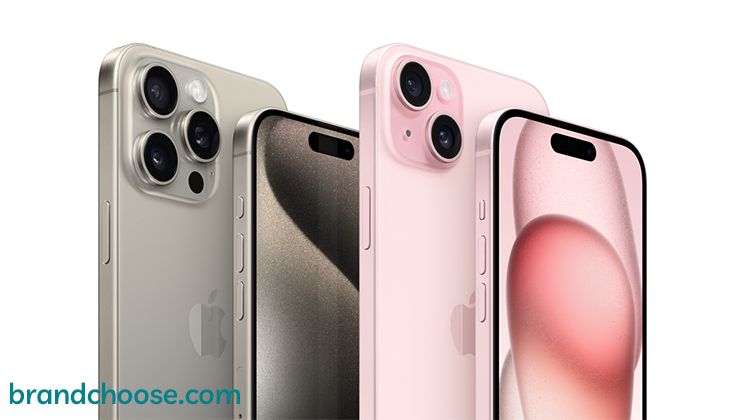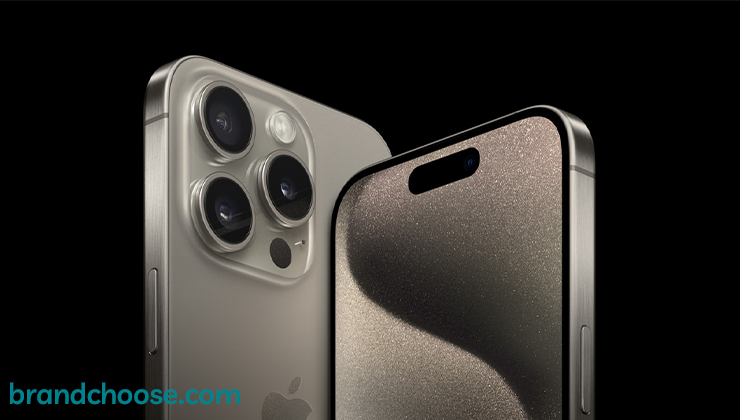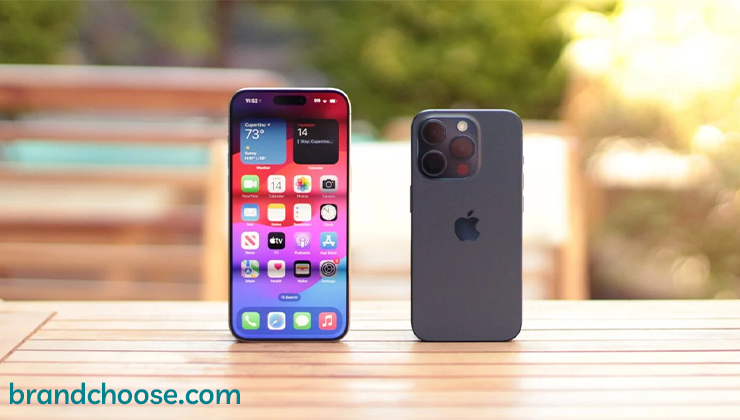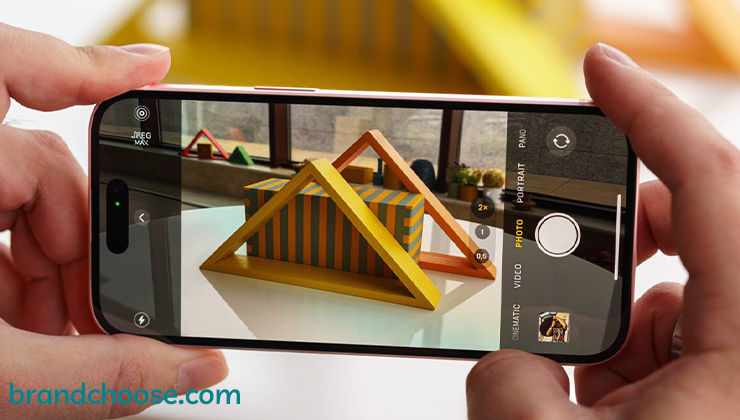Highlights
User security and privacy is in priority
High-quality IOS apps and games
Premium build quality and sleek design
Fast loading and responsive gaming experiences
Seamless data synchronization by iCloud
Support via stores, online and AppleCare services
In the fast-paced world of technology, Apple's smartphones continue to captivate users with their cutting-edge features and sleek designs. From the iconic iPhone to the latest innovations, let's delve into the evolution of these coveted devices.

Product Selection
4.5 /5
Apple presents a diverse array of smartphones, each meticulously crafted to address distinct customer requirements and preferences. The latest additions to their lineup encompass the iPhone 13 Mini, iPhone 13, iPhone 13 Pro, and iPhone 13 Pro Max, all fueled by the A15 Bionic chip, hailed as the swiftest chip ever integrated into a smartphone. Each variant diverges concerning display dimensions, camera functionalities, and battery longevity, affording customers the liberty to select a product that impeccably aligns with their lifestyle and financial constraints. Nonetheless, juxtaposed with brands such as Samsung and Xiaomi, Apple's product assortment may appear comparatively restricted. These rivals offer an extensive spectrum of smartphones, spanning from budget-friendly to top-tier, encompassing an array of features and specifications. Conversely, Apple concentrates on furnishing a more concise selection of premium offerings distinguished by impeccable performance and seamless integration with other Apple devices. This strategy carries its own set of advantages and drawbacks. While it might limit options for consumers operating within a stringent budget or possessing specific feature preferences, it guarantees a uniform, top-tier user encounter across all devices. Moreover, Apple's product portfolio is often lauded for its user-friendliness, facilitating a straightforward decision-making process for customers.
Design/Look
4.9 /5
Apple has always been known for its innovative and sleek design in the smartphone industry. The latest models, such as the iPhone 12 Pro Max, continue this trend with a ceramic shield front cover, textured matte glass back, and a stainless steel frame. The smartphone's flat-edge design, which is a throwback to the iPhone 4 era, is a significant shift from the rounded corners Apple has been using in recent years. This gives the phone a more robust and premium look. The design also includes an IP68 rating for water and dust resistance, which adds to its durability. However, the design of Apple smartphones does have its drawbacks. The glossy stainless-steel band around the iPhone 12 Pro Max, for example, is a fingerprint magnet, which can detract from the overall look of the device. Furthermore, compared to brands like Samsung and Huawei, Apple's design evolution has been more incremental and less radical. While Samsung has ventured into foldable phones and Huawei has experimented with unique camera placements, Apple's design changes have been more subtle and focused on refining the existing design language. Despite this, the design and look of Apple smartphones are still considered one of the benchmarks in the industry, offering a blend of elegance, premium feel, and durability.

Affordability
2.5 /5
Apple's pricing strategy for its smartphones is often a topic of discussion among tech enthusiasts and consumers. Known for their premium pricing, Apple smartphones are typically more expensive than most of their counterparts in the market. This is largely due to the brand's focus on offering high-end, innovative technologies, superior build quality, and a seamless user experience. For instance, the latest iPhone 12 Pro Max is priced at $1,099, which is significantly higher than many flagship smartphones from other brands. However, the high price tag of Apple smartphones can also be attributed to the brand's perceived value and status symbol. Despite the cost, many consumers are willing to pay a premium for Apple smartphones because of their reputation for quality, longevity, and the prestige associated with owning an Apple product. In comparison to other brands like Samsung or OnePlus, which offer competitive specs at a lower price point, Apple's pricing strategy seems to focus more on the overall experience and brand value rather than just the hardware specifications. On the downside, this premium pricing strategy may deter budget-conscious consumers or those who prioritize cost-effectiveness over brand value.
Quality/Durability
4.9 /5
Apple's smartphones, particularly the latest models such as the iPhone 12 Pro Max, are renowned for their exceptional quality and durability. The brand utilizes high-grade materials for its devices, with the iPhone 12 Pro Max featuring a Ceramic Shield front cover, touted as having a 4x better drop performance, and a surgical-grade stainless steel frame. Additionally, it boasts an IP68 rating for dust and water resistance, which means it can withstand being submerged in up to 6 meters of water for up to 30 minutes. However, while Apple's smartphones are generally durable, they are not immune to damage. The high-quality materials used in their construction can make repairs expensive, particularly for screen and battery replacements. Compared to other brands like Samsung or Google, Apple's devices are often seen as more durable due to their superior build quality. However, this does not necessarily translate to longer lifespan, as factors such as software updates and battery longevity also come into play. Despite these potential drawbacks, Apple's commitment to quality and durability remains a major selling point that sets it apart from many competitors in the smartphone market.
Customer Support & Warranty
4.7 /5
Apple's customer support is often hailed as one of the best in the smartphone industry. The company offers a comprehensive range of support options, including online chat, phone support, and in-person appointments at Apple stores through the Genius Bar. Apple's support website also includes extensive documentation, user forums, and troubleshooting tools. The company has recently integrated machine learning into its support services to provide more accurate and personalized assistance. This technology helps to quickly identify the problem and provide relevant solutions, thereby improving the overall customer experience. However, while Apple's customer support is generally efficient and reliable, it has its drawbacks. The wait times can be long, especially for phone support and Genius Bar appointments. Additionally, while the support is free for issues covered under warranty, charges can be high for out-of-warranty services. Compared to other brands, Apple's customer support is often rated higher for its quality and range of services. However, brands like Samsung and Google are also stepping up their game, offering 24/7 customer support and increasingly sophisticated online resources.
Battery Life
4.2 /5
Apple smartphones, particularly the latest models such as the iPhone 12 and iPhone 12 Pro, have significantly improved their battery life, a feature that has been a key focus for the brand in recent years. The iPhone 12 Pro boasts a battery life of up to 17 hours of video playback, thanks to its A14 Bionic chip and the iOS 14's efficient power management. This is a significant improvement from previous models, making it competitive with other leading smartphone brands such as Samsung and Huawei. However, while Apple's battery life is impressive, it does not quite match up to some of its competitors. For instance, Samsung's Galaxy S21 Ultra offers up to 22 hours of video playback. Furthermore, unlike many Android phones, Apple does not offer fast charging technology in all its models, and when it does, it requires the purchase of a separate 20W adapter. On the other hand, the integration of the iOS system with the hardware in Apple smartphones tends to be more efficient, potentially leading to longer battery life over time. Overall, while Apple has made significant strides in improving battery life, it still has some way to go to outperform its competitors in this aspect.
Sound Quality
4.6 /5
Apple smartphones, particularly the latest models such as the iPhone 12 and iPhone 13, are renowned for their superior sound quality. These models feature a built-in stereo speaker system that delivers a balanced, immersive sound. The sound technology in these smartphones is designed to provide a wide stereo playback that makes the audio sound as if it's coming from the space around you, rather than directly from the phone itself. This is a significant improvement over the mono audio that was common in earlier models and is still found in many competing smartphones. In comparison to other brands, Apple's sound quality stands out. Brands like Samsung and Huawei, while offering good sound quality, often do not match the immersive audio experience provided by Apple. However, it's worth noting that Apple's sound quality can sometimes be impacted by the lack of a traditional 3.5mm headphone jack in their newer models, requiring users to use wireless headphones or a lightning connector. This can be seen as a con, especially for users who prefer wired audio devices for their sound quality and reliability. Despite this, the overall sound quality of Apple smartphones, both through speakers and headphones, remains top-tier in the industry.
Display
4.6 /5
Apple smartphones, specifically the latest models like the iPhone 12 Pro Max, are known for their superior display quality. They utilize the Super Retina XDR display, a high-definition OLED panel that offers a resolution of 2778 x 1284 pixels, ensuring sharp and vibrant visuals. This technology supports HDR10 and Dolby Vision, which enhances the color accuracy and contrast ratio, providing a more immersive viewing experience. Furthermore, the ceramic shield front cover offers better durability and scratch resistance compared to previous models. However, while Apple's display technology is impressive, it is not without its drawbacks. The high-resolution display can consume a significant amount of battery life, which could be a concern for heavy users. Additionally, despite its high quality, the display size of the iPhone 12 Pro Max is still smaller compared to some Android counterparts like the Samsung Galaxy S21 Ultra. In terms of refresh rate, Apple still lags behind with a standard 60Hz, while many Android smartphones offer 120Hz for smoother visuals. Despite these cons, Apple's display technology is still considered one of the best in the market, providing a balance between performance and aesthetics.

Performance
4.7 /5
Apple smartphones, particularly the latest models such as the iPhone 13 Pro and iPhone 13 Pro Max, are renowned for their exceptional performance. They are powered by the A15 Bionic chip, which is currently one of the most powerful processors in the smartphone market. This chip is designed to handle intensive tasks smoothly, including gaming, video editing, and multitasking, making the iPhone a highly efficient device. The A15 Bionic chip also integrates a 16-core Neural Engine that enhances machine learning tasks, offering up to 15.8 trillion operations per second. However, while Apple's performance is generally superior, it does come at a high cost compared to other brands, making it less accessible to some consumers. Furthermore, unlike Android smartphones, Apple's iPhones do not support expandable storage, which can limit the performance capabilities for users who require high storage capacity. In comparison to other brands like Samsung or Google, Apple's performance is often considered superior due to its seamless integration of hardware and software, though some critics argue that high-end Android devices offer more customization and flexibility. In terms of raw processing power, Apple's A15 Bionic chip currently outperforms its competitors, but the performance gap between Apple and other top-tier smartphone brands is narrowing with each new release.
Camera Quality
4.8 /5
Apple's smartphones, specifically the iPhone 12 Pro Max, are renowned for their superior camera quality. The iPhone 12 Pro Max boasts a triple-lens camera system, including a 12 MP wide sensor with an f/1.6 aperture, a 12 MP ultra-wide sensor with an f/2.4 aperture, and a 12 MP telephoto sensor with an f/2.2 aperture. This advanced camera system is complemented by the latest technologies such as Night mode, Deep Fusion, and Smart HDR 3, which enhance the photo quality in low light conditions, improve texture and detail, and optimize the color balance of photos respectively. However, despite these impressive features, Apple's camera quality is not without its drawbacks. Some users have reported that the camera can over-smooth skin tones in portrait mode, leading to unnatural-looking images. Additionally, the ultra-wide lens lacks the Night mode feature, which can result in less than optimal photos in low light conditions. When compared to other brands like Samsung and Huawei, Apple's camera quality is generally considered to be on par. For instance, Samsung's Galaxy S21 Ultra also features a sophisticated camera system with a 108 MP wide sensor and two 10 MP telephoto sensors, offering competitive photo quality. However, Apple's edge lies in its seamless integration of hardware and software, resulting in a user-friendly camera interface that is often praised for its simplicity and efficiency.

Conclusion
In conclusion, Apple smartphones have redefined the landscape of mobile technology, setting the standard for innovation, design, and user experience. With each new iteration, they continue to captivate users worldwide, cementing their status as icons of technological excellence. As we eagerly await the next chapter in this ongoing saga, one thing remains clear: the evolution of Apple smartphones shows no signs of slowing down.





